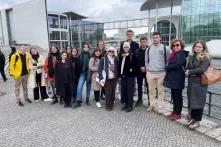Summary of the panel 'People's power vs Climate crisis' at the Budapest Forum on the 16th September 2021. The conference was co-organized by the Municipality of Budapest, Political Capital Institute and CEU Democracy Institute. Heinrich Böll Foundation was a strategic partner at the conference. The panel was moderated by Benedek Jávor, former MEP of The Greens/EFA, currently the Head of Representation of Budapest to Brussels. The keynote was delivered by Ellen Ueberschär, co-president of the Heinrich Böll Foundation.

Climate crisis is coupled with multiple challenges in our social, economic, and political systems. Uneven distribution of the consequences of the ecological destruction and unfair access to natural resources; growing wealth and income disparities globally and on the nation-state level; the fall of trust in the democratic institutions and the emergence of right-wing populism—they all go hand in hand. Solutions to any of these challenges should refer to all the other types of problems. An ecologically and socially sustainable and viable green transition must respect the planetary boundaries while taking onboard each and every member of society, and should actively involve them to not simply surviving or taking profit of the transition but becoming a part and engine of it.
How can we make the climate transition socially just and globally fair? What is the EU's role in the global system and in the Member States to promote the concept of just transition? How can we better involve citizens in the strategic planning and implementation of Europe's climate transition? Is democratic backsliding in some Member States related to their lower climate ambitions? In another way: is democracy a guarantee to better green performance? How can democratic procedures and stable institutions contribute to a more effective climate action?
What is the role of citizens' movements and NGOs in the green transition? Will empowering people bring us closer to climate goals? Does participative decision making enhance effectiveness of climate strategies and stabilize their results in the long term?
These questions were in the focus of a fascinating discussion at the Budapest Forum, in the magnificent buildings of the Central European University (CEU), an institution now in exile in Vienna due to political and legislative pressure from the extreme right populistic Fidesz government.
Climate crisis is here, and it is interlinked with the COVID pandemic, economic hardships, social inequalities, and the backsliding of European democracies – as Ellen Ueberschär (Co-president, Heinrich Böll Foundation) pointed out in her keynote speech. Crises do not exist in a vacuum: air pollution worsened the pandemic, and climate crisis worsened the situation of marginalized groups already facing social injustice. They are the ones most affected by the crises – she added. And authoritarian governments used the pandemic to further curb democratic rights and institutions.
Yet, a crisis can be used as a moment of change: it can lead to structural and societal changes—emphasized Ueberschär. The first of her three theses is that climate justice is a profoundly democratic and social issue. She strongly underlined that climate protection is a natural human right, underpinning her position with the verdicts of German and Dutch courts. The environmental and economic transition goes hand in hand with a social transformation that takes all people equally into account.
Transformation can only become a success story with a strong society with its own take on and interest in bringing forward the transformation – and this takes us to her second thesis. Participative, green, and equitable politics are necessary in order to protect the liberty of societies. Liberty means that every citizen has the right to decide freely about their own future, not determined by restrictive governmental emergency laws. Third, citizens and civil society have to shape the European Green Deal, as civil societies and local communities are the places where change happens. The Green Deal can become a success story only if there is a broad alliance of civil society, economics, science, and trade unions. Responsive city councils and mayors, trustworthy decision-makers and a vision of a fair and just municipality are needed.
This was well echoed in the video message of Virginijus Sinkevičius, EU Commissioner for Environment, Oceans and Fisheries. He emphasized not only the importance of taking everyone on board but strongly underlined the role of young generations in mobilizing European citizens and the European Commission equally. Commissioner Sinkevičius pointed out the high ambition level of the European Green Deal and the Fit for 55 Package, as well as the social aspects of the Commission's climate action. The energy efficiency directive's social elements can contribute to a socially just transition, as well as the Social Climate Fund, which will provide over 70 billion euros between 2025-2032 to compensate the potential costs of vulnerable households linked to the climate transition. Mr Sinkevičius invoked the possibilities of municipalities, NGOs and citizens in the implementation of the EU's climate regulation, but also in the strategic planning, through actions like the Green City Accord or the Conference on the Future of Europe.
Sergey Lagodinsky (Member of the European Parliament, die Grünen/EFA) admitted that the direction taken by the new Commission in 2019 with the Green Deal and subsequent climate decisions is correct. On the other hand, there is not much time left to give an effective answer to the climate emergency, and we should measure our ambitions against this urgency, he pointed out. And the proper targets are only the first step, we need strong implementation and enforcement, and we should also take the social aspects seriously into consideration. This means the necessity of a sort of "left-leaning" policy line, which is proposed, rather unexpectedly, by the German Greens.
The Commission made some steps on this track, but much more is necessary. Authoritarian regimes, like those emerging in the EU nowadays, do just the opposite, according to the German green MEP: they tend to extract fast rent by externalizing costs – in terms of future generations and people who don't live in our country, people of the South, living in a different climate, or on the other side of the border. That is why the constitutional court decision is interesting because the climate crisis is forcing us to redefine our polis, our democratic community: who legitimizes power and to whom we hold accountability, by broadening in terms of time and geography.
The importance of the local perspective was the core message of Ada Ámon (Chief Climate Advisor to the Mayor of Budapest). Not only because a fair share of the global CO2 emissions is produced in and by cities (around 70% in Europe), but also because adaptation challenges are heavily concentrated in the cities. In Budapest, the new city leadership (elected in 2019) is strongly committed to the fight against climate change, well signalled by the very first decision of the City Council to declare a climate emergency, she added. But practical progress is much slower and needs active participation and involvement of the citizens.
Citizens' assemblies on climate and open partnership with the people support the city's efforts strongly. That is especially important in Central and Eastern Europe, Ámon pointed out, as national governments' climate ambitions are systematically low in the region, and more progressive cities can better react to the pressure of the climate-conscious citizens. However, cities' actions are highly dependent on a supportive regulatory environment and the availability of sources.
The role of citizens' participation, the conditions and the results of an effective participatory decision-making proceeding in climate policy was in the heart of the testimony of Amandine Roggeman, who is a member of the French Citizens' Convention for Climate. The Convention was founded after the disastrous introduction of a fuel tax in 2018, which led to the birth of the Yellow Jacket movement and intensive demonstrations in France.
As a sort of correction measure, the French government first organized the so-called 'Great National Debate' to consult with the citizens, and then, in the summer of 2019, 150 citizens were chosen randomly according to some criteria (gender, age, level of education, social and professional categories, geographical area, and type of residency) in order to form a representative panel of the French society. Originally it was promised that the government would translate proposals coming from the Convention into law without any filters, but finally, this goal was not fully met. Yet, important work was done by the Convention, resulting in a final report with 149 proposals by June 2020, which was turned into legislation in July 2021 with the adaptation of the Climate and Resilience Bill. This was an important example of legislation coming from the citizens, and although not all proposals were included in the law, and its ambition (40% reduction by 2030) seems to be a bit lagging behind compared to the EU's 55% target, it was a great experience and a laboratory of participative democracy in climate policymaking.
Pressure from the public and citizens' mobilization heavily contributed to the improvement of the German climate package too, said Ellen Ueberschär in the discussion, even if it is still far from being enough. Climate change is one of the principal topics of the actual federal election campaign as well, where parties are competing with each other on who is more convincing to attract the climate-conscious public, and this is a good thing not only for Germany but also for Europe: if Germany becomes more committed, it can positively influence the EU's ambition level, she added.
To the moderator's question whether based on these positive democratic developments we can identify a link between the state of democracy and the level of climate awareness, Sergey Lagodinsky cited studies suggesting that the correlation is between climate commitment and freedom of the press in a country. Where climate issues are openly discussed in a free media by a flourishing civil society and an independent academic sector, there the public is more likely to understand the urgency of climate action and to put pressure on politicians. NGOs, civil society and citizens are extremely important, but we should regard elements of participative democracy rather as complementary to representative democracy and not as a substitute for it. We need both, and we also have to reinvent the way we think about democracy and about the democratic political community.
Stronger dialogue and cooperation is needed between the society and the decision-makers of all levels, according to Amandine Roggeman, who emphasized the importance of the European level and the necessity of more direct relations between the EU and its citizens. The incoming French presidency of the EU can play an important role in applying the experiences of direct democracy in France with, e.g. the Citizens' Convention for Climate on the EU level. Cities also seek for a stronger, strategic alliance with the EU, told Ada Ámon, which includes their effective involvement in decision-making as well as better access to EU funds to finance their climate action, often against their national governments.
For the full text of Ellen Ueberschär’s keynote speech, click here.


